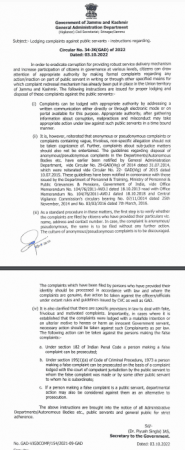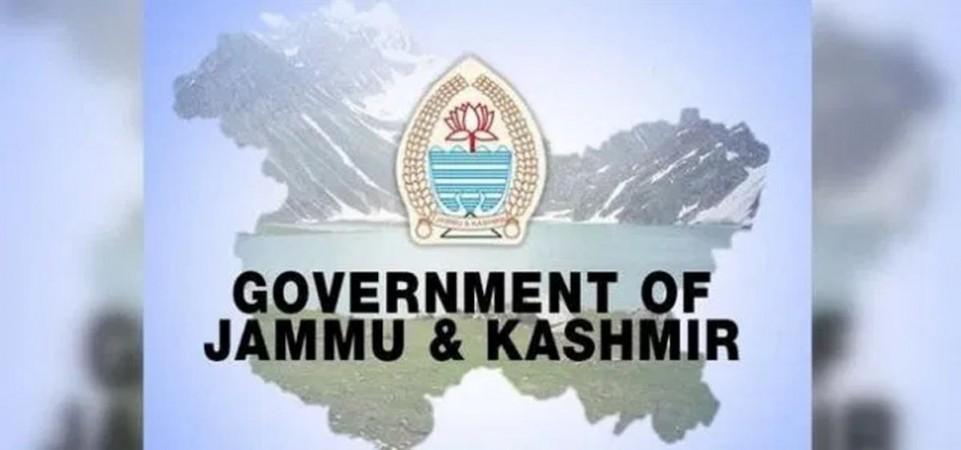As the anti-graft panels of Jammu and Kashmir are flooded with anonymous complaints, the Union Territory government on Monday issued some instructions to discourage this culture. The government, however, issued a guideline for lodging and disposal of complaints against public servants.
"In order to eradicate corruption for providing robust service delivery mechanism and increase participation of citizens in governance at various levels, citizens can draw the attention of appropriate authority by making formal complaints regarding any action/inaction on part of the public servant in writing or through other specified means for which complaint redressal mechanism has already been put in place in the Union territory of Jammu and Kashmir," reads an order issued by the Secretary of the General Administration Department (GAD) of J&K, Dr. Piyush Singla on Monday.

The order issued instructions for proper lodging and disposal of the complaints against the public servants.
"Complaints can be lodged with appropriate authority by addressing a written communication either directly or through electronic mode or on the portal available for this purpose", the order reads.
Appropriate authority, after gathering information about corruption, malpractices and misconduct may take appropriate action under the law against such public servants in a time-bound manner.
Anonymous, pseudonymous should not be taken cognizance
It, however, reiterated that anonymous or pseudonymous complaints or complaints containing vague, frivolous, non-specific allegations should not be taken cognizance of.
"Complaints about sub-judice matters should also not be entertained", the order reads.It also reiterated guidelines regarding the disposal of anonymous and pseudonymous complaints in the departments and autonomous bodies etc.
General Administration Department, it said, vide Circular (No. 29-GAD(Vig) of 2014 dated 31 July 2014), reiterated vide Circular (No. 22- GAD(Vig) of 2015) dated 10 July 2015) guidelines notified in consonance with those issued by the Department of Personnel & Training, Ministry of Personnel & Public Grievances & Pensions, Government of India on 18 October 2013 and Central Vigilance Commission's circulars on 25th November 2014 and 7th March 2016.
"As a standard procedure in these matters, the first step is to verify whether the complaints are filed by citizens who have provided their particulars viz. name, address, and contact number," the government circular reads, adding, "In case, the complaint is anonymous/ pseudonymous, the same is to be filed without any further action."

The culture of anonymous and pseudonymous complaints is to be discouraged, the order stated. The complaints which have been filed by persons who have provided their identity should be processed in accordance with the law, the order reads further.
"Where the complaints are genuine, due action be taken against the officers/officials under extant rules and guidelines issued by CVC as well as GAD."
The government also clarified that there are specific provisions in the law to deal with fake, frivolous, and motivated complaints.
Action will be taken against those who filed a fake corruption complaint
The order further mentioned, "Importantly, in cases where it is established that the complaints were lodged with a malafide intention or an ulterior motive to harass or harm an innocent Government servant, necessary action should be taken against such complainants as per law."
It said under section 182 of the Indian Penal Code, a person making a false complaint can be prosecuted.
"Under section 195(l)(a) of Code of Criminal Procedure, 1973 a person making a false complaint can be prosecuted based on a complaint lodged with the court of competent jurisdiction by the public servant to whom the false complaint was made or by some other public servant to whom he is subordinate."
Also, it said, if a person making a false complaint is a public servant, departmental action may also be considered against them as an alternative to prosecution.
The government said that these instructions have been brought to the notice of all administrative departments and autonomous bodies etc., public servants, and the general public for strict adherence.















